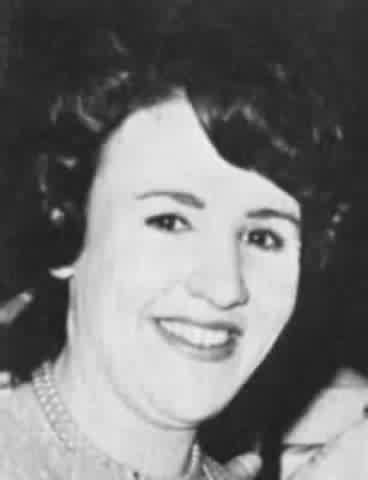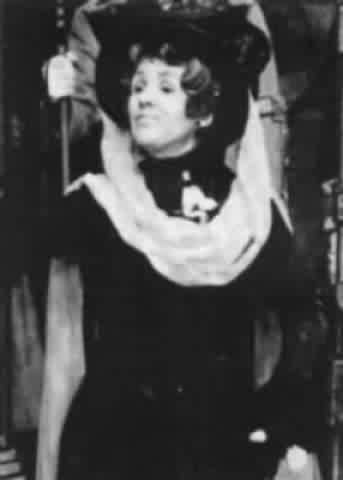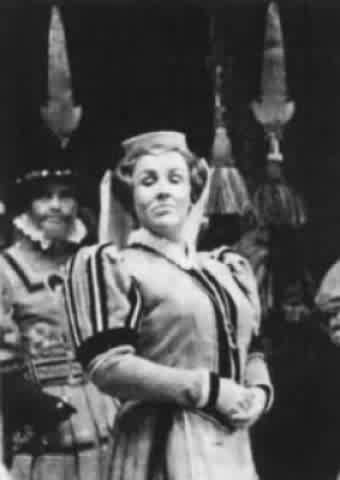|
|
|
 |
Beti, you are one of the longest-serving members of the company, having been with them since September 1956. What made you become a member of D'Oyly Carte?
Well, I had sung all my life, I had been trained from when I was quite a young child and I had sung as a young child. To be perfectly truthful with you, the reason I came for an audition was to hold somebody else's band and I got in. It was just one of those things. I didn't really have an idea of becoming a professional singer. I had always vowed I would never be a professional singer, but I thought that once I started earning my living as a singer it would no longer be a pleasure really. As I say, I was a member of an amateur company and this other person in the company wanted to audition but he didn't want to go alone and so he said 'Well, will you come with me?' and I did. And I got in.
I am the next longest-serving member after John Reed on the stage. Of course Florence Ewbank our wardrobe mistress and Jimmy Marsland on our production staff have longer years of service, and we have some members of the company who have actually had longer associations with the company than I have, but they have broken service. Gordon Mackenzie and Jon Ellison actually have been in the company longer; they joined in 1953 I think it was, something like that, but they have broken service so, of course, they haven't got the continuous number of years that I've got.
You play Inez in "The Gondoliers" and understudy all the major contralto roles - can we talk about Inez first and then go on to the other roles?
 |
I have been playing it for rather a long time - I think I must have been playing Inez about ten years now continuously. I did do a few years and then I stopped playing it when I had my road accident and then I came back about 1963, so it must be ten years. I find myself probably doing most often the role of Katisha because I think we do more Mikados in the season than any other, but I think one of my favourite roles, and I very rarely do it, is Dame Hannah in "Ruddigore". I'm very, very fond of that part. I think it's the only chance really that you have of being a likeable person on the stage in those roles. Most of the other people are tyrants. I think Dame Hannah really is the most likeable of all the contralto roles that I've ever played.
Do you find it difficult to get yourself into the roles when you don't play them regularly?
Well, of course, I've been lucky that I have been at it quite a long time and I have had the chance of playing them all quite regularly. No, I don't think I do have that much difficulty. I think I am rather a domineering type of person anyway, so it almost comes naturally to me! It's awfully difficult to talk about the roles when you don't own them, if you know what I mean. You can't get away from the fact that I am the understudy and it does tend to be a little difficult to discuss them. As I say, I enjoy playing all of them really. thoroughly enjoy them. My favourite is certainly Dame Hannah, I am very very fond of Dame Carruthers in "The Yeomen of the Guard" but then it's very difficult really to pick out one, you know.
Do you have your own way of interpreting the different roles?
I could be wrong, but I feel that I am entirely different maybe from any of the others that have played them because I feel that you've got to have your own interpretation. I think the person who really made the greatest impression on me was Ann Drummond-Grant, who was playing the roles when I joined the Company, and of course I had been quite a keen fan of hers before I joined the company. I had seen her doing most of the roles and I think, of all the people, maybe some of the business I do is Drummie's business. But I think we all have to be individuals playing these parts. It doesn't matter whether you're a principal or understudy, you've got to put your own personality into it really.
Another of your important 'roles', I believe, is that of John Reed's 'mother'?
Oh yes, I'm John's 'mother', I have been ever since December 1956 just shortly after I joined. I am certainly the longest-standing stage mother that he has ever had. It's a tradition John has had ever since he's been in the theatre that he's always had somebody he's adopted as his 'mother'. I think we have carried it to the ultimate. We exchange mother and son Christmas cards, birthday cards and things like that, and I have my own private mother's day whenever we play Oxford. It's never a certain date, but whenever we are in Oxford I have a mother's day and I have a card from John and they are usually cards that have been made by John and they're very personal, they're not just cards which have been bought in a shop. I always go into John's dressing-room before every performance; I think - with the exception of the odd times when I've been off ill - I have never missed a night, and we have the traditional 'good luck' kiss and there are several times when during shows I stand in the wings and I always hold his hand and give him a kiss before he goes on for his first entrance for Robin Oakapple, and we have a little bit of tradition before the second act of "The Yeomen of the Guard" where I read a long screed to him from his book of jokes. We are hidebound almost with our traditional things and I feel that if I missed them something desperate might happen - I don't know whether John feels the same way, but I would hate to miss one of those rituals. It's silly really, but it's sort of crept in over the years. People think we're crackers, they see us sitting on the side of the stage doing silly things and I'm always sitting reading this gibberish from this book. Nevertheless it has to be done, as I say . . . it's traditional. When LA ill I send a letter through somebody with a big kiss at the bottom of it to make up for it. Oh yes, quite crackers - the pair of us! I think we've been here so long we're affecting each other!
 |
Having been with D'Oyly Carte for so many years, do you ever find the operas become repetitive?
No, not really. I think if I ever got to that stage I would certainly have to leave. I have always vowed that if I felt that I was doing something very mechanically on stage in the D'Oyly Carte I would certainly not stay because then, of course, there's no artistry about it, it's just a job. I have said this before, that it doesn't matter how many Iolanthes or Mikados you do, you will always have a different audience so you always have a different reception and so you give a different performance every time. That's my feeling about it, anyway. After I had been here about ten years people started saying to me 'Don't you find that it's mechanical?' and I have been perfectly truthful with them and said 'no'.
I listen to every single word that goes on on that stage because the only way that you can really stay in a show is to be with it. You can't stand there and let everything float above your head and just come in when you're required. You've really got to be with it. You know, even standing in the chorus really - most of my performances are in the chorus - I feel that I've got to listen to every word and I have to concentrate like mad. If I don't, I can go as wrong as the person who's doing it for the first time.
D'Oyly Carte spend most of the year on tour - how does this affect you?
Well, it's getting more difficult as the years go by, of course - touring when I first started wasn't too bad. Well, I mean, I still enjoy touring, but the landladies, theatrical landladies, were still around in those days, of course now they're a thing of the past. And of course in those days very few of us had cars, so we all went on train-calls. A train-call as such now doesn't exist because people join the company with cars. I can remember my first car. I saved up for nearly three years to buy it and I scrimped and saved to get four wheels of my own, and it certainly did make a difference. It makes touring more pleasant, but you do lose the comradeship of these train-calls. The only time that we ever have them now, of course, is on American tours and then you suddenly find that it's like the old days. You're all on a train and you go leaping in and out of other people's compartments and you go and see what they're having for lunch and rush down and wash the lettuce in the washroom together. This is the sort of thing that used to happen on a train-call in England. It was always a joke as to who had the best lunch, because the girls were always vying with each other to provide lunches for the boys in the chorus. The boys, traditionally, always played cards and the girls were always either making lunch or clearing away lunch, before we got to our destination. There was great comradeship in the company, I feel, because of it. You got to know people better. It was far more interesting because, as I say, nearly everybody travelled this way from town to town. There were very few exceptions who did drive a car, there were only a few principals - and I think about three members of the chorus when I first joined - who had their own cars.
Do you stay in digs when on tour?
Well, no, there are very few digs around nowadays. I think I have two digs left on the tours. Most of the time I look for a flat and I cook for myself. Of course that makes life a little easier as well because unless you are with a theatrical landlady who is used to the fact that you maybe rush in at half two for lunch and then come in at half ten, eleven o'clock, absolutely ravenous, there are very few people now who would be prepared to cope with that sort of catering. In the old days they never thought anything of putting on a full three-course meal every night but that sort of thing is really almost a thing of the past.
This leads to your great interest in cooking?
I do enjoy cooking. It's my main hobby really. I play golf, of course, but you can't always play golf because of the weather. My greatest delight is to find I have a very nice kitchen with a decent stove and a refrigerator and things like that. They're part of the essentials of my touring, I feel. Golf and cooking are really my main hobbies. I do a lot of reading as well. I am a very keen reader. I read anything from children's comic books really, if I find some in the digs, right up. But I am an avid reader, I have been all my life. But, as I said, most of my time is taken up with my cooking. That's why I'm so heavy, you see! I've been on this desperate diet for the last week and do you know, I've had so much time on my hands because I haven't been cooking. l've seen television in the afternoons. I've never seen television in the afternoons, ever. Normally I'm up to my eyes in the kitchen but because I've been on a diet I really find time hangs heavily on my hands. I can't play golf in London so there's nothing else to do but just watch television. I'm doing two boiled eggs and half a grapefruit for my lunch, five minutes and that's me finished, and then I think 'What else can I do?'.
I'm not a caravanner, I'm afraid, I like a little more luxury than a caravan. I do enjoy caravanning if I am on holiday, but I'm afraid I like hot and cold running water, I don't fancy the idea of having a caravan. No, I'm just naturally lazy really. It's just not my scene.
Have you ever been through any embarrassing situations on stage?
Oh, I've had lots of embarrassing things. My drawers dropped down in Pirates at the beginning of this last tour - in Bristol. I think one of the funniest things, probably for the other members of the company - it wasn't funny to me at the time - was the fact that I did start to sing Inez an octave too high one time in Southsea. Inez starts in middle 'C' and works up to the 'D' above 'C', and I started a whole octave too high. It was desperate, terrible, I didn't know what to do because I'm essentially a contralto and I would have finished on 'D' in alto had I continued. Fortunately I had the common sense to talk the middle part of it and I managed to catch the note from the orchestra to finish in the right key. I was the only person on the stage who didn't laugh. I bawled my head off at the back of the stage after I'd finished it. l just couldn't believe it. I don't know whether I hadn't concentrated. I heard the note from the orchestra. I just suddenly started off and Ken Sandford was at the back of me trying to give me the note and I kept going up and up and up and I thought 'well, I can't go any further' and so I just had to talk it. And, as I say, the whole company collapsed laughing except me, and the musical director could see the whites of my eyes as I was getting higher and higher. It was ridiculous. Oh heavens, it was frightful. I think that's the worst thing that's really ever happened to me.
How do you enjoy touring in America?
Oh well, of course, I love the American tours. The hospitality is fabulous over there and it makes such a change. The thing is, that the American dollars seem to go so much further than the English pound notes. That certainly helps - and the American tour is lovely because you meet up with a lot of friends that you've met over the past years' touring. Lots of fans. I've met people from home over in the States I haven't seen for years. I didn't even realise they were over there and they've had the local rag from home with the story 'Beti's gone to America' which lists all the places I'm going to. and so they wait until the D'Oyly Carte bills go up in town.
The first trip I ever went on, I had a little note left at the hotel and it was from a boy who said 'I'm sure you won't remember me', and the last time we had met we were both eight years old. He'd left the school I was in. I never found out why he left, but he had left to go to America with his parents. He was a married man by then with two children. He showed me all around. Actually, it wasn't America, it was Canada, but still, he showed me all round Vancouver and it was great seeing him again. It really was.
Do you find the audiences differ in America?
They react absolutely wonderfully. The Americans are very outgoing and they go crazy sometimes if they really like it. The Canadians tend to be a little British about it and they're more reserved. American audiences are really wonderful . they really seem to enjoy it enormously, they really do.
| Artist Index | Main Index |